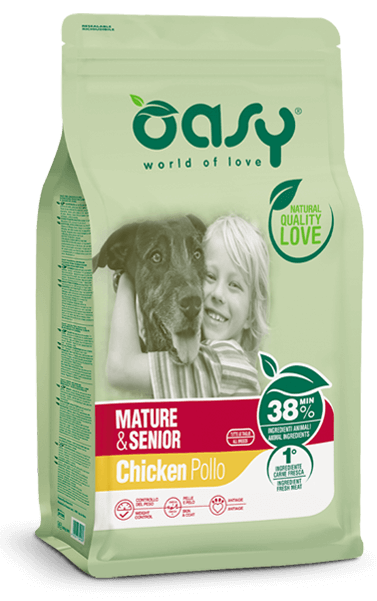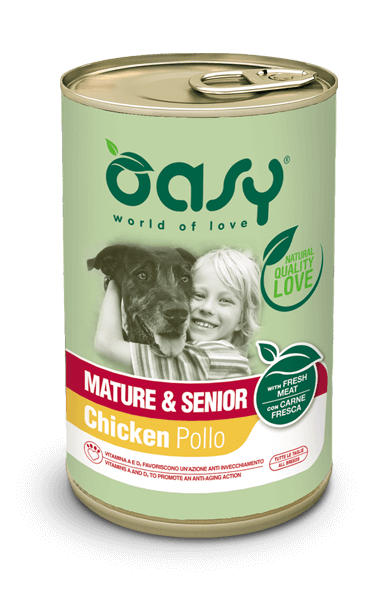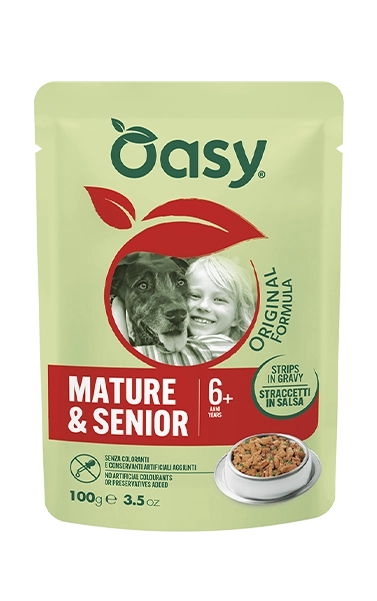When dogs enter their senior years, their needs change too: everything you need to know about feeding older dogs to ensure their health and vitality.
As the years go by,
our dog’s needs evolve. Their pace slows, they rest more often, and their body begins to require extra care.
Nutrition plays a key role in this delicate phase, as it can make all the difference between
healthy aging and the onset of minor issues. In fact, while
puppy nutrition is essential to support growth, and
adult dog nutrition requires a shift in perspective,
senior dog nutrition also
follows specific rules to help our four-legged friends stay healthy and full of life. In this article, we’ll explore what their diet should look like, which nutrients become even more essential with age, and how to respond to reduced appetite or digestive issues.
Senior Dog Nutrition: What Changes
Just like us,
aging is a natural phase of life for dogs. These changes occur gradually: movement slows down, sleep increases, muscle mass may decrease, as well as the desire to be active. Some dogs become more calm and affectionate, others more sensitive to stimuli or less tolerant of change. It’s a delicate transformation that deserves attention and care.
Each dog is different, and their “chronological age” doesn’t always match their biological age. For instance, a
small breed dog can remain lively and energetic well past 10 years old, while a
large breed dog may
start showing signs of aging as early as 7.
Senior dog nutrition isn’t just about adjusting portion sizes or choosing softer food. It should be
tailored to the dog’s health condition, breed, activity level, and individual history. It’s about guiding them through this new stage of life—supporting a slower metabolism, protecting their joints, strengthening their immune system, and helping prevent common age-related issues like dental or digestive problems.
To support this life stage in the best way possible, at Oasy we offer a variety of
foods specifically formulated for mature and senior dogs of all sizes. Our
Mature & Senior line, available in both
dry and wet options, is designed to
promote vitality in senior dogs with selected ingredients and specific nutrients that support joint health, immunity, and weight management.
Key Nutrients for Senior Dogs
As dogs age, their
energy requirements tend to decrease, especially if
physical activity becomes limited. However, this doesn’t mean they should eat less—it means they need
foods suited to this life stage, containing the following essential nutrients:
- High-quality proteins to help preserve muscle mass. Senior dogs still need a good amount of digestible, moderate protein to avoid straining the kidneys and liver.
- Essential fatty acids (Omega-3 and Omega-6) that help support skin protection and maintain healthy skin and coat.
- Vitamins, particularly A, D3, and E, to strengthen natural defenses and offer anti-aging benefits.
- Natural complexes such as citrus extract, rich in bioflavonoids, that provide antioxidant and anti-inflammatory support against free radicals.
- Minerals like Calcium and Phosphorus, essential for bone health, especially in large breed dogs or those prone to joint issues.
When Appetite Changes: Common Issues and Subtle Signs to Watch
At this life stage, it’s normal for a dog’s eating habits to shift. A
senior dog may
not eat as eagerly as before or may
start drinking more often. Every change in behavior should be carefully observed: it could indicate discomfort or simply a change in taste preferences.
Dental problems, for example, are common in older dogs and can make chewing difficult. In such cases, it can help to
alternate senior dog kibble with
wet food, which is easier to chew and often more palatable.
Loss of appetite is also possible. Our recommendation is to
offer smaller portions,
monitor flavor preferences, and if needed,
consult a veterinarian to rule out underlying conditions.
If your senior dog is drinking more than usual, it’s important to
consult your trusted vet: this behavior can be linked to kidney or hormonal issues.
Hydration, however, remains essential at any age, so
alternating dry and wet food can be a great way to
support natural hydration.
Also, keep in mind that even in their golden years there are
foods to avoid: chocolate, onions, avocado, grapes, and foods high in sugar or salt should never be given. For more information, read the article "
The 10 Foods You Should Never Feed Your Dog (and the Safe Alternatives)".
Oasy’s Solutions to Support This Life Stage with Quality
Every dog deserves a diet tailored to their age and habits. That’s why at Oasy we’ve developed
specific solutions to meet the needs of senior dogs, according to their lifestyle and preferences.
- Oasy Lifestage Mature & Senior Chicken (dry food) is designed for your senior dog’s wellbeing. It includes citrus extract to help fight free radicals thanks to its antioxidant and anti-inflammatory action. With chicken as the first ingredient and a well-balanced protein-to-fat ratio, it promotes optimal physical condition. Perfect for senior dogs of all sizes who may be slowing down, but still enjoy life actively.
- Oasy Lifestage Mature & Senior Chicken Paté (wet food): soft, tasty, and enriched with vitamins A and D3 to offer anti-aging benefits and support vitality and wellbeing. Ideal for dogs with dental issues or to enhance mealtime appeal.
A dog’s aging process is not something to fear — it’s a natural journey to be embraced. A
well-balanced senior dog diet can truly make a difference: it helps keep their metabolism active, reduce age-related discomfort, and preserve their daily energy.
And let’s not forget one last detail: every meal is also a
moment of connection. A daily gesture of love expressed through the right ingredients, the right timing, proper portions, and all the care we naturally give to those who’ve been loyal to us for a lifetime.


